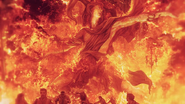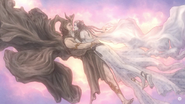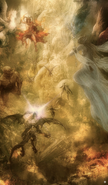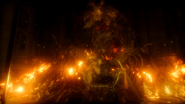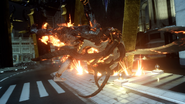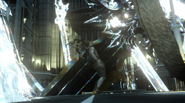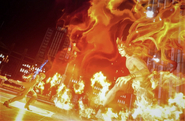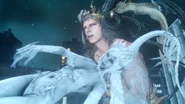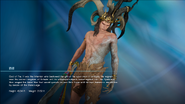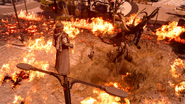Template:Sideicon
God of Fire. It was the Infernian who bestowed the gift of fire upon the man in antiquity. He reigned over the ancient kingdom of Solheim until his once-loyal subjects turned against him. The Pyreburner then waged the Astral War that would quench his own life's flame until his own daemonic resurrection by means of the Starscourge.
Bestiary
Ifrit, also known as the Infernian, is an Astral in Final Fantasy XV. He is one of the Six and the god of fire. He plays an important role in Eos's history. His role was initially minor and shrouded in mystery, but the additions of new cutscenes, in-game bestiary and Final Fantasy XV: Episode Ardyn have shed more light to his role in Eos's past.
Profile
Like the other Astrals, Ifrit is based on a recurring summon in the Final Fantasy series. Unlike his more leonine appearances since Final Fantasy VIII, Ifrit in Final Fantasy XV appears as a demonic humanoid, and after patch 1.21, appears more like a daemon as his coloration was darkened. In Final Fantasy XV: Comrades his "infection" doesn't seem to have progressed as far yet as in the main game, and his appearance is slightly different. He has long brown hair, orange eyes and no eyebrows. Pre patch 1.21 he had bronze skin, which was changed to gray, although the pre-patch design was eventually used for the boss fight against him in Episode Ardyn.
Ifrit is smaller than most Astrals, but bigger than a normal human, able to hold a person in the grasp of his hand. Whether he was always this size is unknown, as he is depicted as being proportional to Shiva—presumably still in her giantess form—in the story she tells to Noctis aboard the Magna Fortia.
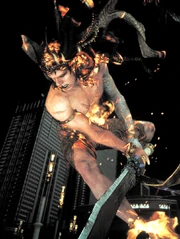
Ifrit's original model.
Ifrit wears golden wrist and ankle bracers, and a golden crown adorned with red jewels. He has long twisted horns and claw-like nails. He is topless and radiates heat, the air around him aflame. He sits on an elaborate throne made out of bones. He wields a sword whose hilt is encrusted with red and white jewels, and has a gold and purple scarf wrapped around it, held in place by a gemstone bracelet and a metal chain. The sword's blade is worn, and Ifrit's body is scarred. In his original model his left arm and leg were gray, as if petrified. In his updated model these parts of his body are black, reminiscent of Ravus Nox Fleuret's boss form.
Cosmogony describes Ifrit as "fickle" and "wicked", and Ardyn Izunia says Ifrit has no compassion toward mankind. However, according to Shiva, during the Old Calendar Era Ifrit was different, admiring humans and granting them his blessing of fire.
Like Leviathan who can turn into liquid, Ifrit can turn into flames, and appear and disappear at will.
Story
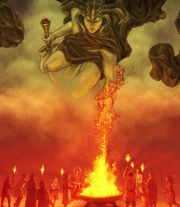
Ifrit gives mankind the knowledge of fire.
Ifrit is one of the six Astrals who ruled over Eos; he is the God of Fire, standing equal and opposite to Shiva, the Goddess of Ice. Humans were created in the Astrals' image, and though most Astrals were indifferent to man's fragile and ephemeral existence, the God of Fire admired their strength of will. Granting mankind his flame, a civilization flourished: Solheim. Ifrit's benevolence warmed Shiva's heart, who likewise came to love humans and fell in love with Ifrit.
Some people of Solheim began to see themselves as superior to the gods and spurned their blessings. Due to the perceived betrayal of the Astrals by Solheim's people, Ifrit declared war on them, triggering the War of the Astrals. The Six are sworn to protect Eos, even from each other, and thus the other Astrals turned against Ifrit. The war culminated in a battle between Bahamut and Ifrit, the latter's body being laid asunder upon the Rock of Ravatogh.
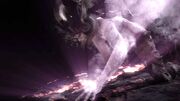
Ifrit wages war.
Ifrit's actions caused him to be labeled as "the Betrayer", which was how he would be remembered by humans after rebuilding themselves into the nations of Lucis, Accordo, Tenebrae and Niflheim, with only Niflheim seeking to emulate the glories of Solheim. Although Ifrit was gone, the malady of Starscourge that had spread during the war[1], which transforms humans and animals into daemons, still threatened Eos; only the power of the prophesied "True King", using the Astrals' blessing and the power of the Crystal granted to mankind by the planet itself, can destroy it. The king chosen to safeguard the Crystal was meant to be Ardyn Lucis Caelum, but due to absorbing the Starscourge to heal others, as well as his brother's selfish desire to become king over Ardyn, he was rejected by the Crystal and demonized by his successors.
Two millennia later in late M.E. 720, the Niflheim Empire under the direction of Verstael Besithia uncovered Ifrit's slumbering body from the Rock of Ravatogh and preserved him on ice. When Ifrit awoke in an imperial laboratory almost a year later, he attempted to kill everyone on the premises due to rage over man "making a mockery of a god." Surprised to find a member of the Lucis Caelum bloodline, he picked Ardyn up on the palm of his hand. Ardyn daemonified Ifrit with the Starscourge and glimpsed into the god's memories. As Ardyn descended into mania over want for revenge, he declared to use the subjugated Ifrit to burn Lucis to the ground. In M.E. 734, Ardyn summoned Ifrit upon Insomnia and commanded the Infernian until the Fire God was defeated by Bahamut.
Shiva sought to save Ifrit, but as she awoke in M.E. 745, she was slain by the magitek infantry of the Niflheim Empire, her colossal body abandoned to the outlands of Ghorovas Rift. Shiva awoke when she sensed "a mortal drawing the Pyreburner away from the Light", and although Ardyn is immortal in human terms, the Astrals seem to simply refer to all humans as "mortals."
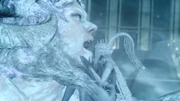
Shiva freezes Ifrit with her kiss.
When Shiva meets Noctis Lucis Caelum in M.E. 756, the Crystal's Chosen, she tells him the story of Ifrit and asks him to grant the Pyreburner release. Ardyn summons Ifrit to delay Noctis's party when he arrives at the ruins of Insomnia in M.E. 766 to fulfill his role as True King. Noctis and his friends fight Ifrit with the backing of the other Astrals. Bahamut rains down swords from the sky, which Ifrit dodges. Amid the chaos Noctis cleaves off one of Ifrit's horns. After weakening the Astral further, Shiva appears, saying; "Pyreburner. That heart of flame was turned to ash once. A dead flame must burn no more. Taste again the chill wind of death." Shiva performs Diamond Dust, which encases Ifrit in ice, before kissing him and shattering his body.
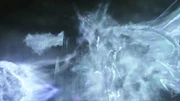
Shiva carries Ifrit's horn.
As Noctis sits upon the throne and calls down the kings the Astrals show up and turn into energy, entering the Ring of the Lucii alongside Noctis and the kings. Shiva carries Ifrit's severed horn as they dissipate.
Gameplay
Boss

Noctis cleaves off Ifrit's horn.
Ifrit is fought as the penultimate boss. There are stages to his battle, and the player can summon the Astrals against him. This is the only battle where Bahamut can be summoned. Defeated, Ifrit drops the Infernian Shards key item, described as a proof of his demise at the hands of Noctis. It doesn't have a usefulness other than as a souvenir.
Summon
Ifrit is a party member and boss in Final Fantasy XV: Episode Ardyn. He has 9999 HP and three main attacks the player can invoke with the tech command: Meteor Strike, Flames of Rage, and Firaga. He starts with Firaga and the player can unlock the other techs from the Descension ability tree by collecting AP from felled foes. When he is summoned the battle arena is engulfed in flames. Ifrit can break through the guardians' barriers.
Ardyn cannot summon Ifrit during his Overkill mode.
Ifrit is on Lv.46 (same level during his encounter with Noctis in Insomnia) and has maxed-out stats.
Creation and development

Ifrit's orginal and updated character models.
Ifrit is glimpsed at the very beginning of the game. Ifrit's early appearance was intended by the game's director Hajime Tabata as a mysterious stinger, like the opening of Final Fantasy II.[2][3] The depiction of an event late in the game was inspired by Crisis Core: Final Fantasy VII, a storyline tying into the opening of Final Fantasy VII.[4]
Ifrit's character model was changed in patch 1.21, making it darkener and the corruption of the half of his body more apparent. The background of the Astrals' bestiary page was likewise updated to reflect the change, but Final Fantasy XV: Comrades Archives still show the original character model.
Voice
Ifrit is voiced in Japanese by Yasuhiro Mamiya and in English by John Kassir.
Musical themes
The track that plays for Ifrit's boss battles is "Hellfire", named after Ifrit's recurring summon attack from the series. In the main game it ends with the iconic "Prelude" that has been part of the series since the original Final Fantasy. The beginning bars for the track also played when Ardyn summoned Ifrit upon Insomnia during its Founder King's Day festivities.
When commissioning the music for the Ifrit battle, Sho Iwamoto, audio programmer at Square Enix, sent the composer a gameplay video, and requested music that is easy to transition. The first transition to "pre-end" part of the music happens when the player has damaged Ifrit enough for him to get into the "serious mode". The last transition from pre-end to the end part of the music aims to synchronize with the long ending scene.[5]
Non-Final Fantasy guest appearances
Gallery
- Final Fantasy XV
- Episode Ardyn
Etymology and symbolism
Template:See Also In Arabian mythology, Ifrit (also spelled Efreet or Afreet, from Arabic عفريت Ifrīt), is the name given to a class of Jinn (Demons also known as Djinn, Djinni, and Genie) that embody fire. Though they could live for thousands of years, they were not immortal, and if cut, they would "bleed" the fire running through their veins until it consumed their bodies.
Ifrit in Final Fantasy XV resembles the original definition of efreet in Islamic lore, being enormous flaming derivatives of djinn that inhabit ruins and reside underground, and are feared for their wicked nature. Ifrit is also reminiscent of Iblis or Shaytan, who in Islam was a djinn that refused to bow down to Adam, the first human.
In Christian terms, Ifrit is comparable to Satan or Lucifer, who scorns God's creations after he and his followers were cast from heaven due to his pride as God's first and closest angel. The War of the Astrals in Final Fantasy XV (where Ifrit rose against mankind and fought the other Astrals before being killed by Bahamut) may be in parallel to the War in Heaven described in the Book of Revelation of the Bible waged between the angels led by the Archangel Michael against those led by Satan, who are defeated and thrown down to the earth. The War in Heaven is related to the idea of fallen angels. Bahamut's incarnation within Final Fantasy XV may draw upon the archangel Michael, who is considered the Sword of God and the leader of God's forces against the Dragon.
Ifrit also has similarities with Samael, who in Judaism is considered the archangel to test and judge humankind in the face of sin and temptation. Samael is also known as the Angel of Death, and is sometimes conflated with the traditional depictions of Satan. In Buddhist terms, Ifrit can be seen as Mara taken form as Namuci or Dairokuten Maou, who is said to be the Demon King proper. He is the divine being said to keep all in the desire realm—a realm of sensual and material sensations that includes the six realms of existence, one being the world of Men—under his control.
Trivia

Artwork of Chaos's throne for the original Final Fantasy.
- Ifrit's throne resembles the throne Chaos sits in in a concept art piece by Yoshitaka Amano for the original Final Fantasy.
- According to Shiva, Ifrit granted the gift of fire to mankind out of admiration for their strength of will. In Greek mythology, Prometheus stole fire from Mount Olympus and gifted it to humans. As punishment, Prometheus was chained to a rock and cursed to have an eagle devour his liver for eternity. The theft of fire for the benefit of humanity is a theme that recurs in many world mythologies.
- The lore in Ifrit's bestiary entry is slightly different between different translations. The Japanese version says Ifrit was the King of Solheim[6] who in ancient times had given them fire and the "flame of knowledge", but doesn't mention his subjects rebelling against him. It posits Ifrit was resurrected via Starscourge that corrupted his body and mind. The English description says Ifrit's "once-loyal subjects turned against him", but doesn't mention the corruption of his body and mind. The German version says Ifrit was once "a lover of mankind" whose gift of knowledge led to the success of the Solheim civilization. It doesn't mention Ifrit being the King of Solheim, but says the people of Solheim became drunk with power and turned against "the Gods", and that Ifrit's mind and body were corrupted by the Starscourge.
- In Episode Ardyn, Ifrit was shown to have awakened without any apparent aid from Ardyn while the latter was fighting off Lucian royal guards.
- Ifrit's body having been laid to rest at the Rock of Ravatogh is mentioned in a loading screen for the English, German and Portuguese localizations of Episode Gladiolus, but is absent from other versions. This detail was later added to the Royal Edition almanac entry to the Rock of Ravatogh, and is mentioned in the Archives of Episode Ardyn.
- In the German localization, Shiva tells that Ifrit wanted to destroy Eos itself along with humanity because Solheim's betrayal broke his heart.[7] In the English version, it seems he only wanted to destroy Solheim. Final Fantasy XV: Official Works also posits Ifrit wanted to destroy the planet itself alongside mankind.[8][9]
- Ifrit doesn't talk when encountered as a boss in Final Fantasy XV, but he does converse with Ardyn in Final Fantasy XV: Episode Ardyn before being daemonified.
- Despite being sealed away before the founding of the kingdom of Lucis, Ifrit knew of the Lucis Caelum line, as he is surprised when he recognizes Ardyn in Episode Ardyn. When Ardyn daemonified Ifrit and glimpsed at his psyche, he saw himself as the Chosen King inside the Crystal, implying Ifrit knew about this as well.
References
- ↑ "Ancient history is marked by the prosperity of the civilization of Solheim. When this civilization was at its peak, the betrayal of one of the six Astral gods, Ifrit, led to a conflict known as the Great War of Old. This was fueled by the spreading of a mysterious parasite, causing the death of millions, and ultimately the fall of Solheim." The Complete Official Guide pg. 318
- ↑ An Extensive Look At Final Fantasy XV's First Chapter (dead) (Accessed: November 29, 2016) at GameInformer
- ↑ Hajime Tabata Talks About The Opening Chapter In 'Final Fantasy XV' (Accessed: April 08, 2019) at Forbes
- ↑ Famitsu No. 1450 "発売まで, 2力月 - 『FFXV』"いま", pp. 108–128
- ↑ https://youtu.be/jtoyunrO62I?t=46m9s
- ↑ Bestiary: 古代文明ソルハイムに君臨した王でもある
- ↑ Shiva: Dieser Verrat brach Ifrit das Herz und entfachte seinen Zorn. Blind vor Wut wollte er diese Welt mitsamt der Menschheit einäschern. Und so… blieb dieser Göttin keine Wahl. Sie musste gegen Ifrit Kämpfen, um Eos zu schützen.
- ↑ ''Final Fantasy XV Official Works'' translations by higharollakockamamie (Accessed: July 16, 2018) at higharollakockamamie @tumblr
- ↑ Gentiana's character profile from ''Final Fantasy XV Official Works'' translated by higharollakockamamie (Accessed: February 09, 2019) at higharollakockamamie @tumblr




